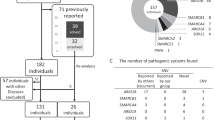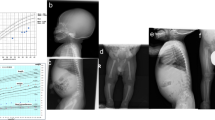Abstract
Hirschsprung disease (HSCR) is sometimes associated with a set of characteristics including mental retardation, microcephaly, and distinct facial features1,2,3, but the gene mutated in this condition has not yet been identified. Here we report that mutations in SIP1, encoding Smad interacting protein-1, cause disease in a series of cases. SIP1 is located in the deleted segment at 2q22 from a patient with a de novo t(2;13)(q22;q22) translocation. SIP1 seems to have crucial roles in normal embryonic neural and neural crest development.
This is a preview of subscription content, access via your institution
Access options
Subscribe to this journal
Receive 12 print issues and online access
$209.00 per year
only $17.42 per issue
Buy this article
- Purchase on Springer Link
- Instant access to full article PDF
Prices may be subject to local taxes which are calculated during checkout


Similar content being viewed by others
References
Goldberg, R.B. & Shprintzen, R.J. J. Craniofac. Genet. Dev. Biol. 1, 185–189 (1981).
Mowat, D.R. et al. J. Med. Genet. 35, 617–623 (1998).
Fryer, A.E. Clin. Dysmorphol. 7, 97–101 (1988).
Brooks, A.S. et al. J. Med. Genet. 36, 485–489 (1999).
Kumasaka, K. & Clarren, S.K. Am. J. Med. Genet. 31, 465–466 (1988).
Yomo, A., Taira, T. & Kondo, I. Am. J. Med. Genet. 41, 188–191 (1991).
Hurst, L.A., Markiewicz, M., Kumar, D. & Brett, E.M. J. Med. Genet. 25, 494–500 (1988).
Tanaka, H., Ito, J., Cho, K. & Mikawa, M. Pediatr. Neurol. 9, 479–481 (1993).
Lurie, I.W., Supovitz, K.R., Rosenblum-Vos, L.S. & Wulfsberg, E.A. Genet. Couns. 5, 11–14 (1994).
Halal, F. & Morel, J. Am. J. Med. Genet. 37, 106–108 (1990).
Yanagisawa, H. et al. Development 125, 825–836 (1998).
Hofstra, R.M.W. et al. Am. J. Hum. Genet. 64, 304–308 (1999).
Eisaki, A., Kuroda, H., Fukui, A. & Asashima, M. Biochem. Biophys. Res. Commun. 271, 151–157 (2000).
Verschueren, K. et al. J. Biol. Chem. 274, 20489–20498 (1999).
Remacle, J.E. EMBO J. 18, 5073–5084 (1999).
Acknowledgements
We thank the families and patients for participation; S. Tsuji for critical reading of this manuscript and discussions; and K. Miura and S. Miyazaki for help with clinical studies. This work was supported by grants from Ministry of Education, Science, Sports and Culture of Japan (to N.W. and K.K.) and Tsubaki Memorial Neuroscience Research Foundation (to N.W.).
Author information
Authors and Affiliations
Corresponding author
Supplementary information
Rights and permissions
About this article
Cite this article
Wakamatsu, N., Yamada, Y., Yamada, K. et al. Mutations in SIP1, encoding Smad interacting protein-1, cause a form of Hirschsprung disease. Nat Genet 27, 369–370 (2001). https://doi.org/10.1038/86860
Received:
Accepted:
Issue Date:
DOI: https://doi.org/10.1038/86860
This article is cited by
-
“Liu-Liang-Chung” syndrome with multiple congenital anomalies and the distinctive craniofacial features caused by dominant ZEB2 gene gain mutation
BMC Pediatrics (2023)
-
Clinical characteristics of Polish patients with molecularly confirmed Mowat-Wilson syndrome
Journal of Applied Genetics (2021)
-
Genetic interaction screen for severe neurodevelopmental disorders reveals a functional link between Ube3a and Mef2 in Drosophila melanogaster
Scientific Reports (2020)
-
Requirement of the Mowat-Wilson Syndrome Gene Zeb2 in the Differentiation and Maintenance of Non-photoreceptor Cell Types During Retinal Development
Molecular Neurobiology (2019)
-
Genome-wide analysis of endogenously expressed ZEB2 binding sites reveals inverse correlations between ZEB2 and GalNAc-transferase GALNT3 in human tumors
Cellular Oncology (2018)



